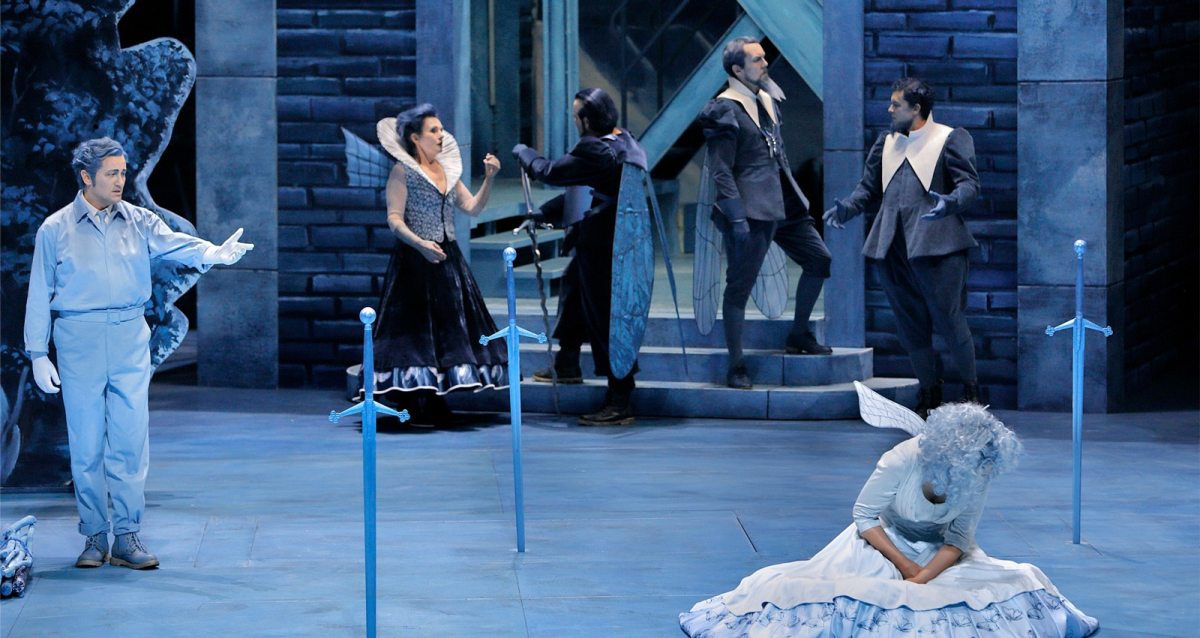The term Wagnerian never applied to me, though Bayreuth holds a special place in the family lore. In the 1950s, a rare honor was bestowed upon my grandfather: along with the other chosen ones, he was permitted to play his violin in the theater’s “mystic void.” (Also known as the pit.) When I went to Bayreuth for the first time on assignment, at 26, I felt a certain pride in belonging, too. Not that anyone told me I should feel that way. It was like a kind of persistent murmur, which stuck with me despite the theater’s 19th-century-train-station façade.
All I had to do was think of the names: the legendary conductors, singers, directors. Or the tickets: how hard they were to come by! It helped that the dynasty was still going strong. You could spot Wagner’s distinctive nose on some of them. And though it was easy to act skeptical beforehand, when you got there, and the politicians’ limousines drove up the Grüner Hugel, past the locals lined up in honor guard formation, it made an commanding impression. “He’s here, too,” the regular guests would mutter.
I never came to Bayreuth to rub elbows with the powerful, or scope out the latest fashion trends. (Though the evening gowns have improved somewhat since the tasteless heydays of the ‘80s.) But I also never blamed the composer for that side of Bayreuth. Wasn’t there something magnificent about the monomaniacal obsession it took to build an entire palace, all for just 10 “valid” operas? And wasn’t it unbelievable that the house had been running since 1876? There was enough pure weirdness to balance out the vanity. Let the rich and powerful press the flesh and pose, I thought, as long as the art was being made to exacting standards on the inside.
The more I went to Bayreuth, though, the more I realized that the music and the hype were two sides of the same coin. Look closer at the tangle, and the different strands are impossible to pull apart. Wagner preferred his music to be heard alone, so that the influences of his colleagues might go undetected. That arrogance—or insecurity—peaked with his “Parsifal,” which was only ever intended to be heard at Bayreuth. (It was freed up for performance elsewhere by a Reichstag decision in 1913.) You might think you’re just there for the music, but the fact is that you are still participating in an entirely invented, cultish religion, subjected to a sphere of influence. No wonder successive German governments choose Bayreuth to display their feeling for the arts.
When Friedrich Nietzsche attended the first Bayreuth Festival, he was put off by the exclusivity, ideology and uncritical hero-worship. “The Wagnerian has become the master of Wagner,” he wrote. Nietzsche perceived this as something very German, as did Hitler, for whom it was a positive trait. Of course, Bayreuth has confronted this aspect of its history. But here’s the problem: all the political awareness, all the scathing directorial concepts, all the booing and scandals, serve to cement the status of the 10 operas and whichever Wagner descendant is presiding over them. I get the impression that the central conceit of Bayreuth is worn-out, and every year appears more anachronistic and even anti-European.

A decade ago, the directors Nike Wagner and Gérard Mortier tried to shake things up. They applied to take over the festival after the tenure of Wolfgang Wagner. It would have been a new team made up of the smartest of Wagner’s descendants and Europe’s most brilliant artistic director. But their far-fetched idea of rethinking tradition doomed their application to fail. In the meantime, Nike seems relieved: “Doing just Wagner all the time is boring,” she said last year. For me, Bayreuth nowadays is more of a curiosity than anything else. A gigantic hamster wheel, with directors racing each other to prove their relevance; an exhausted Dracula, sucking the lifeblood from artists from outside the music scene; a museum of local history, starring an international elite of singers, who appear to be of the opinion that no one needs to understand the words.
Wagner’s legacy is fresher elsewhere, and not just on stage. A critical edition of his writings is in progress, which will make the reality behind his self-promotion apparent and show the historical context from which his music came. As late as 1859, he still planned on moving to Paris for ever. Listen to Berlioz’s “Les troyens,” and you realize that Isolde’s Liebestod was neither the first nor the most passionate. You also realize that sometimes Wagner’s lengthy passages are just lengthy. It’s good to take a step back, and see the composer as he was: a somewhat approachable neurotic. But if you prefer to think of him as the man in the high castle, Bayreuth is the right place for you. ¶


Comments are closed.